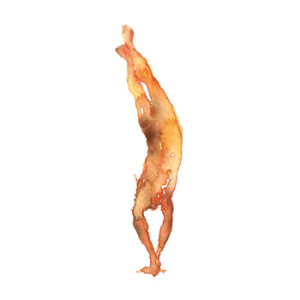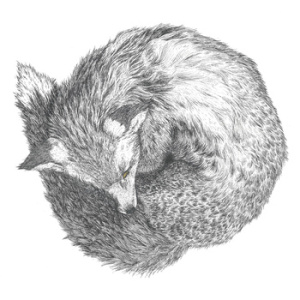
Arts Fishing Club‘s self-titled debut EP shows off the many skills of Christopher Kessenich. In just over 20 minutes, Kessenich blows through southern rock, troubadour folk, and Damien Rice-esque roaring ballads. Through it all, Kessenich delivers memorable melodies and tight production that point to more great things in the future.
Kessenich’s nom de plume Arts Fishing Club evokes a pastoral sort of image, and the album art reiterates it. The music isn’t quite as rustic as both would imply: while highlight “Rarin’ to Roam” has a sonic lineage stretching way back through folkies like John Denver and Bob Dylan, the arrangement and production are bright and modern. The verses and chorus melodies stick with me, and the whole thing comes off as a mature, polished folk-pop track. If AFC goes this way, there’s a world of Lumineers fans that would be all about this. But Kessenich can howl with the best of them, as “Bottle of Wine” is a sad-hearted ballad that ratchets to a huge, dramatic ending–he could move this direction too.
For those not intrigued by earthy troubadour folk or acoustic ballads, “Ground She Walked” and “Take a Walk” let the distorted guitars fly. They’re still grounded in acoustic songwriting, but they’ve got a crunchy edge that evokes the acoustic/grungy vibes of the mid-’90s. Kessenich morphs his voice once again into a grittier tone and a more attitude-heavy delivery. Some people’s experiments clearly show which avenues should or shouldn’t be pursued, but his project has a lot of avenues available to it after this EP. With talent to spare and room to sonically roam, Arts Fishing Club has a lot going for it.
—

Devin James Fry is working through some identity issues right now: last year’s Headwater Songs came out under his own name, this year’s Jump Into the Fire 7″ came out under the Salesman moniker, and Four Dreams is from Devin James Fry and the Name Sayers. [Editor’s note: Fry would land on the moniker Name Sayers, which is where the current links go.] The opposite is true of the sonic spaces depicted in these releases: Fry has been honing his sound meticulously, and Four Dreams sharpens all his ideas to fine points. “I Touch My Face In Hyperspace Oh Yeah” and “Upbringing” focus on his noisier realms: the former marryies clanging, angular guitars to driving rhythms and howling baritone vocals to create a uniquely frantic environment; the latter is a composed mostly of Fry’s haunting vocals and complex percussion–also a unique mood. Fry’s version of rock music is untethered from the normal lineage and bonafides, creating a genuinely exciting aura. The enthusiasm of the Jump Into the Fire 7″ lands here, on this side.
The other side of Fry’s mental map shows up in “Pearl Made, Gold Stayed” and “Wheel,” where he lets his softer songwriting shine. Even when writing something intended to be quiet, Fry keeps the tension and motion present–“Pearl Made, Gold Stayed” shows off his signature guitar style and thumping percussion in a different setting. It’s ultimately a moving tune in the emotional sense as well: “life pays in pearls, not gold / and you know how pearls are made.” “Wheel” ends the collection by picking up where Headwater Songs left off (“Oh Lord, I am a wheel of Colorado sand”) and creates a delicate, flowing environment with his guitar style and vocals that is distinctly his own. If you’re not on the Devin James Fry train yet, you need to be: he’s making gems over here. Four Dreams is a definite contender for your end-of-year EP list.






